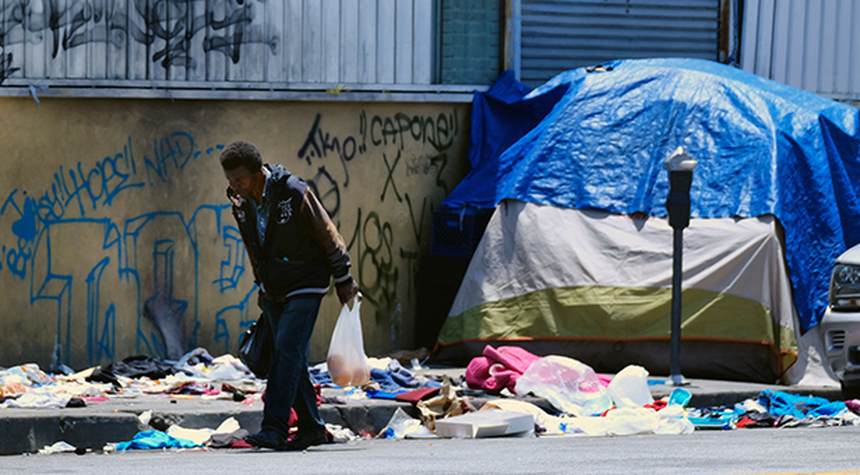My wife and I often travel to Washington state and we used to stop for the night in a small town called Klamath Falls, Oregon. My wife had booked a room online at the same hotel we had used the year before. We pulled up, checked in, and drove to the room. We “stayed” about three minutes. The hotel was a homeless haven. The door of the room we had booked, was open. A man was about 10 feet from our room sitting on the ground smoking. “We’re not staying.” I turned the car around and my wife told the clerk that we were leaving and to credit our payment. The clerk understood.
Using hotels to room “homeless” is one of the worst of bad ideas. Don’t take my word for it – hotel owners across America have seen their properties vandalized destroyed, gutted, or burned to the ground by “homeless” occupants.
Last month, LA City council members wanted to force hotels to house the homeless alongside paying guests. The proposed ordinance would have required hotels to report open rooms by 2 PM which would have allowed the city to hand “vouchers” to homeless addicts and mentally ill people. In theory, and by example, the Ritz Carlton would be forced to give open rooms to a homeless addict with a hotplate, right next to a couple paying $300 a night. The ordinance was voted down. One of the few sane council members, Joe Buscaino, called the measure the “dumbest” he had ever seen. Hotel owners and tourism lobbyists convinced enough council members to agree and vote it down.
During the pandemic, LA City decided to house the homeless at hotels. It was a disaster. One hotel owner described what happened: Rampant drug use and constant fights. Small fires eventually led to bigger fires. Thus, it was tried during the pandemic with awful results. So when you have an abject failure on your hands, what do you do? You double down. After the ordinance was voted down, the council voted to put the measure on the ballot for 2024.
The ballot measure reads:
“The Los Angeles Responsible Hotel Ordinance will help ensure that new hotels do not contribute to the City’s lack of affordable housing, burden the City’s social services, or result in undue transportation and traffic impacts. New and already existing hotels will be required to adhere to responsible business practices, including making guest rooms available to unhoused Angelenos on a non-discriminatory basis, and be subject to City oversight.”
I’m guessing, but if the nuts in LA City vote for this, I think the main oversight will be firefighters on ladders dowsing flames. If the measure passes in 2024, LA hotels might be a mass of smoldering wreckage just in time for the 2028 Olympics.
It doesn’t take a Ph.D. in social science to see that housing the homeless in hotels right next to paying customers is a terrible idea. Some think that hotels will use this to “get rich.” That, I think, is an absurd suggestion.
If hotels are burned to the ground by the homeless or constantly wrecked and vandalized what insurer would be dumb enough to insure them? Are hotel owners dumb enough to take short-term money and risk long-term disasters? I don’t think so.
Well, gosh, why not just convert small hotels into homeless “homes”? Yeah, that doesn’t work. In 2021, in Fresno, a homeless person burned down his (or her) hotel room. It was repeated at a different location in 2022, where a homeless occupant burned up a motel. It has been repeated in San Francisco, Seattle, San Jose, and many many more cities. I stopped looking for examples to keep this article shorter than Melville’s “Moby Dick.”
Austin, the most liberal city in Texas, decided the best way to deal with homelessness was to buy a hotel for nine million dollars and house the homeless. Great idea, right? It didn’t turn out quite the way Austin liberals envisioned. It was wrecked from top to bottom.
“This damage spans all three floors of the building and nearly every room,” Kelly said Thursday. “Nearly every door is bashed in. Clothing, belongings, and trash were strewn throughout the property and several televisions were ripped from the drywall and stolen. The entire hotel was stripped of copper. Washers, dryers, air conditioning systems and electrical wiring were destroyed.”
The good news for Austin? Its hotel wasn’t burned to the ground — likely because there was nothing left to burn. So, Austin can still house its homeless at its nine-million-dollar debacle. It still has a roof – I think.

